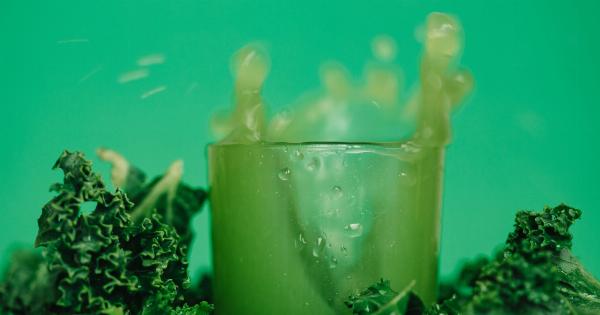Cancer is a complex and devastating disease that affects millions of people worldwide. Over the years, various treatment options have been developed, including chemotherapy, which involves the use of powerful drugs to kill cancer cells.
While chemotherapy has been effective in many cases, it often comes with significant side effects and limitations. In recent years, researchers have been exploring the potential synergistic effects of combining chemotherapy with other treatments to improve outcomes for cancer patients.
The Antioxidant Power of Vitamin C
Vitamin C, also known as ascorbic acid, is a powerful antioxidant that plays a crucial role in maintaining overall health. It is known for its ability to boost the immune system and protect cells from damage caused by free radicals.
Vitamin C is also involved in the production of collagen, a protein that strengthens tissues, supports wound healing, and promotes healthy skin.
Studies have suggested that higher intake of vitamin C may be associated with a lower incidence of certain types of cancer. However, the use of vitamin C as a standalone treatment for cancer is not yet fully supported by scientific evidence.
Nevertheless, recent research has shown promising results when vitamin C is used in combination with chemotherapy.
Enhancing the Efficacy of Chemotherapy
Chemotherapy drugs work by targeting and killing rapidly dividing cells, which include both cancerous and healthy cells.
Unfortunately, these drugs can also cause damage to healthy tissues and organs, leading to unpleasant side effects such as nausea, vomiting, hair loss, and fatigue. Moreover, some cancer cells can develop resistance to chemotherapy, making it less effective.
Combining vitamin C with chemotherapy aims to address these limitations and enhance the efficacy of treatment. Vitamin C has been found to selectively enhance the effects of chemotherapy on cancer cells while reducing its toxic effects on healthy cells.
This selective cytotoxicity makes it an attractive adjunct to chemotherapy, potentially increasing its effectiveness and reducing side effects.
Mechanisms of Synergy
There are several mechanisms through which the combination of vitamin C and chemotherapy may synergistically enhance cancer treatment:.
1. Increased Production of Hydrogen Peroxide
Vitamin C, in high doses, can be converted into hydrogen peroxide (H2O2), a reactive oxygen species known for its toxic effects on cancer cells.
Normal cells have efficient mechanisms to neutralize H2O2, while cancer cells often have lower levels of these protective systems, making them more susceptible to oxidative damage. Combining vitamin C with chemotherapy drugs can potentiate the production of H2O2 selectively in cancer cells, leading to increased cancer cell death.
2. Sensitizing Cancer Cells
Vitamin C has been shown to alter the gene expression of cancer cells, making them more sensitive to the effects of chemotherapy.
It can inhibit the activation of certain proteins involved in drug resistance, thus overcoming one of the major obstacles to successful cancer treatment.
3. Protecting Healthy Cells
Chemotherapy often damages healthy cells along with cancer cells, leading to various side effects. Vitamin C acts as a potent antioxidant, helping to protect healthy cells from the oxidative stress induced by chemotherapy.
This protective effect can mitigate the side effects of treatment and improve overall quality of life for cancer patients.
4. Enhancing Immune Function
Vitamin C plays a crucial role in supporting a healthy immune system, which is a vital component in fighting cancer.
It can enhance the function of immune cells, increase the production of antibodies, and improve the overall immune response against cancer cells. By boosting the immune system, vitamin C complements the action of chemotherapy drugs, leading to a more robust and comprehensive attack on cancer.
5. Reducing Inflammation
Cancer often induces inflammation, which can promote tumor growth and progression. Vitamin C has anti-inflammatory properties and has been shown to inhibit various inflammatory pathways.
By reducing inflammation, vitamin C supports the efficacy of chemotherapy and may help in slowing down the growth and spread of cancer.
Combining Chemotherapy and Vitamin C in Clinical Trials
Clinical trials are underway to further investigate the effects of combining vitamin C with chemotherapy in cancer treatment.
These trials aim to establish optimal dosage, timing, and administration methods, as well as to identify specific types of cancer that may benefit the most from this synergistic approach.
Early results from these trials have shown promising outcomes.
One study conducted in patients with ovarian cancer found that the combination of high-dose intravenous vitamin C with chemotherapy led to improved overall survival compared to chemotherapy alone. Similar positive results have been reported in other types of cancer, including pancreatic, lung, and breast cancer.
Conclusion
The synergy between vitamin C and chemotherapy in cancer treatment offers a promising avenue for improving outcomes and reducing the side effects of chemotherapy.
The combination of high-dose vitamin C with chemotherapy has shown potential in selectively targeting cancer cells, sensitizing them to chemotherapy, protecting healthy cells, enhancing immune function, and reducing inflammation. However, further research is needed to determine the optimal use of vitamin C as an adjunct to chemotherapy and to identify the specific cancer types and stages that may benefit the most from this approach.






























